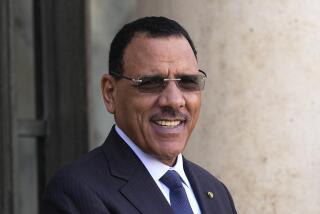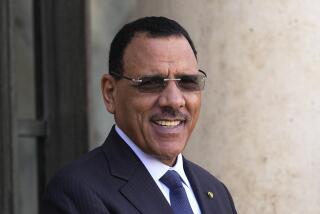Niger Leader Dies of Brain Tumor; Cousin Takes Over
- Share via
PARIS — Maj. Gen. Seyni Kountche, who survived four coup attempts as president of the west African state of Niger since 1974, died today in a Paris hospital due to complications from a brain tumor, the hospital said.
Kountche, 56, had arrived at Pitie Salpetriere Hospital on Saturday for the fifth time this year for treatment of the tumor. The first trip came after he fell unconscious for two hours on New Year’s Eve from a brain hemorrhage.
In Niamey, Niger’s national radio announced earlier in the day that a cousin of Kountche, Col. Ali Seibou, head of the country’s armed forces, had taken over Kountche’s duties because of the general’s “pressing health problems.”
It was not clear whether Kountche had yet died when Seibou took power.
Kountche’s death followed a palace coup in Tunisia on Saturday in which 84-year-old “President for Life” Habib Bourguiba was removed from power. Zine Abidine ben Ali, the prime minister, replaced Bourguiba, saying his competency had been impaired by senility and ill health.
Western diplomats in Niamey said the public became aware that the president was ailing in January when he had to be helped from the set during an appearance on national television.
Ousted Corrupt Regime
Niger is a poor nation of 6.6 million people where Kountche took power from a corrupt civilian regime in 1974, overthrowing President Hamani Diori, who had led Niger since independence from France in 1960.
In 1984, he freed Diori from prison on the 10th anniversary of his military coup.
Kountche thwarted four coup attempts in his 13 years in power. Since 1983, he had been a general and was president of the Supreme Military Council made up of 12 officers, which administered the country. He also was the defense minister and interior minister.
The country has had little rain during the last 17 years and it lies in the center of the belt of the world’s so-called seven hungriest nations--the Sahel countries on the southern fringe of the Sahara.
Despite the drought, Kountche led Niger into becoming a model of sensible development and survival, using one of its chief resources, uranium, for income.
Kountche was an ascetic and blunt-speaking leader of the mostly Muslim nation, calling for an effort similar to the post-World War II Marshall Plan to combat famine in Africa. Kountche also tried to keep his country from getting caught up in the long-running desert conflict between two neighbors, Libya and Chad.
He threw out Libyan diplomats in 1981 out of fears that Col. Moammar Kadafi wanted to expand his so-called Islamic empire to include Niger. But Kountche at the time declined a French offer to send troops to Niger to help provide security.
More to Read
Sign up for Essential California
The most important California stories and recommendations in your inbox every morning.
You may occasionally receive promotional content from the Los Angeles Times.













